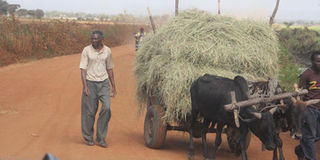How drought gave Mwea farmers new income stream

Rice farmers move hay from rice straws at Mwea irrigation scheme in Kirinyaga County on February7, 2015. Rice farmers in Mwea are making good returns from rice straws, which they used to burn previously thanks to livestock herders from arid areas, who came looking for animal feed three years ago in the area. PHOTO | JOSEPH KANYI
What you need to know:
- Some farmers now say that the hay is even more profitable than rice. A bale goes for Sh200 earning a farmer Sh150 profit. In a good day, one can sell 50 bales, minting Sh7,500 profit.
- For Ms Wambui Gatimu, hay provides her with business all-year-round. She is now able to provide food, clothes and raise more money her children’s school fees.
Rice farmers in Mwea are making good returns from rice straws, which they used to burn previously.
Thanks to livestock herders from arid areas, who came looking for animal feed three years ago in the area, the farmers have established a new income stream.
Like desert locusts in search of food for life, herders from Isiolo, Garissa, Marsabit and Moyale invaded the rice farms in 2012, and pleaded with the farmers to let them take the straws or buy them in order to save their stock.
This served as an eye-opener for the locals, who started making hay and selling it at a profit.
Since then, usually busy Embu-Makutano road has been the meeting point for buyers and sellers.
MORE THAN RICE
Some farmers now say that the hay is even more profitable than rice. A bale goes for Sh200 earning a farmer Sh150 profit. In a good day, one can sell 50 bales, minting Sh7,500 profit.
“We hire machines and the owners charge us Sh50 to make one bale,” a farmer, Mr Peter Muthike, 38, said.
Mr Muthike said the new trade has helped him a lot in raising school fees. “As for me, it is double profit. After harvesting rice, I sell my produce. What remains are the rice straws, which I turn into hay for sale,” he added.
Ms Sophia Wambura said her regular customers come from Isiolo and Meru.
“To me, this is a good business and I’m not giving up any time soon. Customers queue to buy hay and my only task is to make as many bales as possible and receive cash.”
For Ms Wambui Gatimu, hay provides her with business all-year-round. She is now able to provide food, clothes and raise more money her children’s school fees.
“I’m in business all seasons because I stock enough rice straws, which I use to make hay. When I do not have straws, I buy them from my colleagues, who have many rice fields,” she said.
Agricultural researcher, Dr Raphael Wanjogu, said farmers can make a fortune out of rice straws.
“Rice straws make good hay for livestock and farmers are capitalising on them. Farmers have become enlightened and are doing good business in the scheme,” he said.
Dr Wanjogu, who is in charge of Mwea Irrigation Agricultural Development Centre, has urged the farmers to keep up the spirit.





